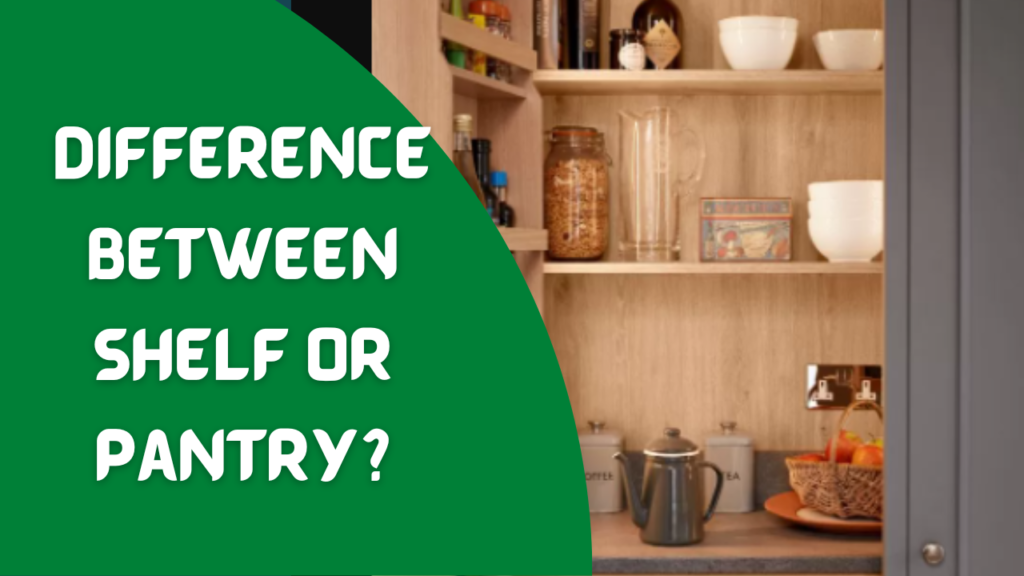
It’s essential to have a designated space for storing your food. The question is: what type of storage should you use? Shelf or pantry? Take a look at the pros and cons of each option before deciding which one might work best for you.
Shelves vs. Pantry
Shelves are generally easier to manage than a pantry. However, shelves always have a few drawbacks.
- First, if you choose to use shelves, you’ll need at least two vertically stacked units.
- You’ll also need at least six inches of clearance on each side to get the food from one unit to another.
- Finally, you’ll also have shelf space above or below your storage units and alongside your shelves. This wasted space can add up, especially if you store large containers.
- Using a pantry eliminates shelf space and can cost more upfront.
However, it provides more storage space and is much better for organizing your food. Plus, it will allow you to save floor space and other kitchen areas for other necessary functions.
Also, pantries hold fewer items than shelves but are useful because they store food away from light, heat, and moisture. You can use pantries to create a designated area within your kitchen.
If you use pantry space, buy a sturdy, durable model. The last thing you want is your storage unit collapsing on top of you or a family member. Also, ensure that the shelves are well-built for heavy loads and have latches or locks to keep things safe.
Should pantry shelves have wrap-around shelves?
Even while it offers a lot of storage space, a pantry with deep shelves can be challenging to access and make it difficult to keep track of what’s in there. Constructing shelves around the room’s perimeter may remedy these problems without sacrificing excessive storage space.
Do you need a pantry in your kitchen?
A pantry can provide adaptable kitchen storage ideas to match the demands of any home. These ideas include tailored mesh baskets for storing vegetables, particular wine storage, open shelves to keep dry products, and an area dedicated to storing plugged-in gadgets.
What is the purpose of a pantry?
There is counter space in the pantry that it may be used for either the preparation of meals or the storage of equipment. The pantry has outlets so you can use your smaller home appliances. In addition, you can store large things in the cubby holes that are located beneath the counter. Some of these cubby holes have L-shaped shelves that wrap around a corner. The shelves in some of the other cubby holes are adjustable.
What is the shelf life of pantry foods?
Foods’ shelf life and ingredients’ whole garlic’s shelf life is three to four months. A powder made of garlic for two to three years. Ground ginger, aged between two and three years 1–3 years for the aging of marjoram.
Why does anything expire?
It is not that no one element determines the shelf life of food, but rather that the following four factors are far more significant than others:
- Variations in microorganisms
- Movement of moisture and vapor
- Biochemical or chemical reactions
- Consumer engagement with food packaging
- Local warehousing
A product’s shelf life is when you can keep it in storage before it loses its quality and becomes unsuitable for consumption or sale. That is to say, it might mean that something is no longer usable and thus no longer belongs on the shelf, either in a kitchen or at a grocery store, unfit for sale but not yet unfit for use).
Melons may be kept in the freezer for up to a year, whereas most other fruits are at their peak flavor during the first six months. Likewise, there is a two-year window in which nuts stored in the freezer are at their peak freshness. Frozen veggies typically last anywhere from eight to twelve months. However, you should eat tomatoes and bell peppers within three to four months of freezing. To avoid a bitter aftertaste, never freeze salad greens or green onions.
Dairy products have a relatively long shelf life.
Milk and cheese aren’t the only dairy products that benefit from cold storage conditions. Powdered milk and ice cream are the only products not included in this guideline. Although the exact length of time that each type of dairy product may be stored varies, it’s safe to say that you shouldn’t stock up on too much of any one kind because it will likely spoil quickly. However, it is OK to consume dairy products beyond their best-by dates in many circumstances. For example, maybe they won’t have a great flavor!
Fat product shelf life
Since fats do not include any water, the amount of microbes in the food is reduced, allowing the product stored for longer. As a result, they don’t need to be kept refrigerated and may instead be kept out of the cold. You should not freeze fatty and oily foods.
How long can I store my grain, flour, and wheat-based products?
The food in this group has a very wide range of storage lives. For example, products made from grains like rice may be left out for far longer than those made from flour and wheat like bread, partly because of the absence of preservatives in the former.
However, there are some other details you should be aware of since they are often necessary for preserving the freshness and quality of your fruit and vegetables:
- Apple gas causes discoloration, so keep apples and other produce in separate plastic bags and drawers in the fridge.
- Place citrus fruits in plastic bags or containers and store them in a cool, dark place, away from other produce.
- The grapes will keep longer if they are kept in a covered bowl.
- Seal melons airtight with cling wrap to prevent their odor from permeating other meals.
- Keeping tomatoes fresh in the fridge requires wrapping each one individually on paper.
- It’s a good idea to allow some air to circulate around your stored vegetables by poking holes in your plastic bags.
- Produce should be kept in the refrigerator’s produce bins.
- Storing potatoes and onions apart is recommended because their volatile gases might hasten the spoilage of one.
- If you’re going to store your vegetables in the refrigerator, don’t wash them first. Instead, make sure you’re ready to consume them before you do this.
You should not risk food poisoning, salmonella poisoning, or any other problems by eating food beyond its expiration date. One simple approach to avoiding this is to track when you purchased the food in your fridge and when it was supposed to expire.
